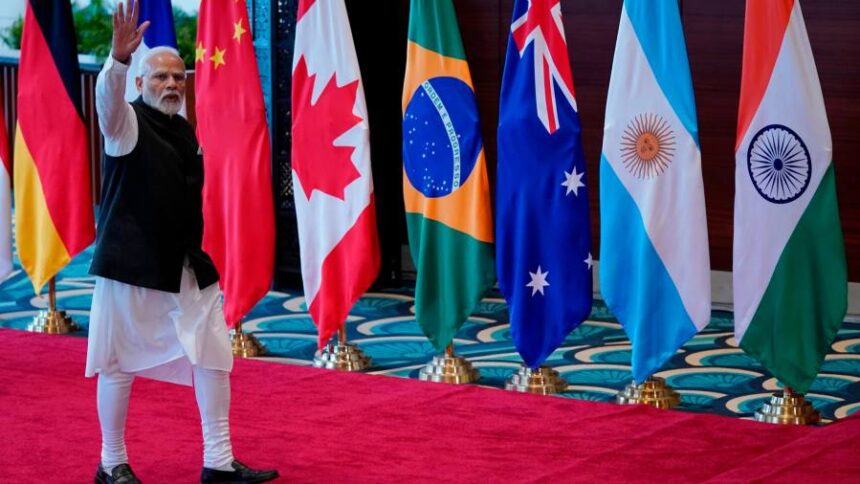Receive free G20 updates
We’ll send you a myFT Daily Digest email rounding up the latest G20 news every morning.
The US and EU have backed the development of a new ship and rail corridor connecting India to the Middle East and the Mediterranean Sea in a challenge to China’s economic clout in the region.
The plan was launched on the sidelines of the G20 summit in New Delhi on Saturday, through a memorandum of understanding agreed by leaders including US president Joe Biden, Indian prime minister Narendra Modi and Saudi Crown Prince Mohammed bin Salman, who all shook hands at the end of the event.
The proposed corridor would stretch across the Arabian Sea from India to the United Arab Emirates, then cross Saudi Arabia, Jordan and Israel before linking up to Europe.
Talks about such a project, which would also include a new undersea cable and energy transport infrastructure, have been going on behind the scenes between the countries involved for months, but they will now proceed on a more formal basis. No binding financial commitments were made but the parties agreed to come up with an “action plan” over the next 60 days.
Biden said the corridor would offer “endless opportunities” for the countries involved, “making it far easier to trade [and] export clean energy”, and “lay cable that will connect communities”. He said it would “contribute to a more stable and prosperous Middle East”.
“This is nothing less than historic. It will be the most direct connection to date between India, the Arabian Gulf and Europe,” European Commission president Ursula von der Leyen said at the launch of the project.
“It is a green and digital bridge across continents and civilisations,” she said, adding that the rail link would make trade between India and Europe 40 per cent faster.
For the US, the project could act as a counter to Beijing’s growing influence in the region, at a time when Washington’s traditional Arab partners, including the UAE and Saudi Arabia, are deepening ties with China, India and other Asian powers.
The planned corridor’s passage through Jordan and Israel could also support the Biden administration’s efforts to build on the recent normalisation of relations between Israel and several Arab states, including the UAE, as it pushes Saudi Arabia to follow suit and formalise ties, a person briefed on the discussions said.
“China is one factor. The US is also trying to refocus attention on the region, to reassure traditional partners and to maintain influence,” the person said. Jake Sullivan, the US national security adviser, however said there was no particular link with the Israel-Saudi normalisation talks.
“It is not a specific precursor to normalisation. It is not tied to the broader discussions that we are having on the normalisation issue,” he said.
“It is a distinct bet that all of the participants and sponsors are making that by working together on this issue and by investing in regional integration of this kind, it will deliver practical benefits.”
The EU’s role in the agreement was negotiated during a visit by von der Leyen to Abu Dhabi on Thursday, EU officials said, during talks with UAE president Sheikh Mohammed bin Zayed al-Nahyan.
The collaboration is a central part of the EU’s effort to deepen trade and investment ties with Gulf countries, the officials added, particularly in response to Russia’s war against Ukraine.
The EU has earmarked spending of up to €300bn on overseas infrastructure investments between 2021 and 2027 through its Global Gateway project, launched in part to rival China’s Belt and Road Initiative and defend European interests in key trade partners.
Both Saudi Arabia, the world’s top oil exporter, and the UAE, the Middle East’s dominant finance centre, are seeking to project themselves as key logistics and trade hubs between east and west.
However, ambitious cross-border infrastructure projects in the Arab world have historically gained little traction, including a planned 2,117-km rail network connecting the six members of the Gulf Cooperation Council — Saudi Arabia, the UAE, Kuwait, Qatar, Oman and Bahrain. It is still only part built more than a decade after its inception.
Jon Finer, the deputy national security adviser, told reporters earlier that the development of the corridor was consistent with the Biden administration’s push to “turn the temperature down” and “de-escalate conflicts” in the region, while increasing “connectivity”.
But the principles of the project also aimed to stand in contrast to the type of infrastructure funded by China’s Belt and Road Initiative, whose funding has been criticised for being opaque and forcing poorer nations into debt traps.
“We see this as having a high appeal to the countries involved and also globally because it is high-standard, it is not coercive . . . we are not trying to impose anything on anyone,” Finer said.
The EU and US also made a separate announcement on the sidelines of the summit on a trans-African corridor between the Democratic Republic of Congo, Zambia and Angola, aimed at improving trade in raw materials including copper.








